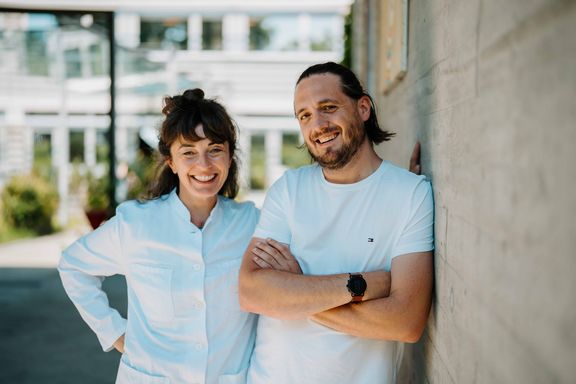Christina Naverschnigg
„Die Ausbildung an der FH Kärnten in der Gesundheits- und Krankenpflege war für mich eine Zeit, in der ich mich ständig neuen Herausforderungen…
Unser neues Stipendium für den Karrierewechsel in die Gesundheits- und Krankenpflege!
Wir freuen uns, in Kooperation mit der Privatstiftung Kärntner Sparkasse ein exklusives Stipendium anzubieten, das speziell für Umsteiger*innen konzipiert ist, die sich für ein Studium der Gesundheits- und Krankenpflege entscheiden. Das Stipendium richtet sich an Absolventinnen und Absolventen anderer Studiengänge sowie an Personen über 30 Jahre, die einen beruflichen Neuanfang suchen und bisher nicht förderberechtigt waren.
Mit einem großzügigen Betrag von 5.000,- Euro, der im ersten Studienjahr in zwei Tranchen ausgezahlt wird. Die erste Auszahlung erfolgt im Dezember, die zweite im Mai nach erfolgreicher Absolvierung des ersten Semesters und bei aktiver Inskription ins Studium. Es werden insgesamt 10 Stipendien vergeben.
Erforderliche Unterlagen:
Interessierte können sich nach erfolgter Bewerbung für den Studiengang
Einreichtermin ist bis zum 30. August 2025.
Finanzielle Sicherheit während des Studiums
Das Pflegestipendium der Bundesregierung bietet Umsteiger*innen finanzielle Unterstützung von über 1.500 Euro monatlich (€ 51,20 pro Tag).
Wer kann das Stipendium in Anspruch nehmen?
Deine Schritte zum Pflegestipendium
Nutze die Chance, Deine Karriere im Gesundheitswesen mit dem Pflegestipendium der Bundesregierung zu beginnen. Besuche die Website für mehr Informationen unter Pflegestipendium » alle wichtigen Informationen | AMS und bewirb Dich noch heute!

Die Humanomed Gruppe vergibt Stipendien an FH Studierende der Gesundheits- & Krankenpflege: https://humanomed.bewerberportal.at/Job/222718
Das Stipendium beinhaltet:

In the course of studies in Healthcare and Nursing at the Carinthia University of Applied Sciences, theoretical, nursing, medical, scientific, communicative and legal basics are taught/learned and consolidated in practical training within the 3 years. Half of the course of study is implemented in the "real" professional field" and offers the opportunity to reflect on the acquired knowledge and nursing activities from the very beginning and to establish a continuous theory - practice transfer.
Internships are an indispensable prerequisite for obtaining a professional qualification. The aim is for students to learn to think critically, to justify their actions on a sound scientific basis and to implement or apply new knowledge. Both the theoretical and practical training deals with the repositioning of the upper level of the nursing profession and the associated transfer of competencies within and between the occupational groups in the health care system. From the very beginning, students learn basic knowledge about their job description and their position in an interdisciplinary team.
Graduate nurse (Diplomierter Gesundheits- und Krankenpflegerin/ Diplomierter Gesundheits- und Krankenpfleger
Bachelor of Science in Health Studies (BSc)
Please contact us if you have any questions about your studies:

With over 100 Study & Work partner companies and organizations, CUAS offers students the opportunity to combine studying and working!
Social change processes, such as demographic change and socio-cultural shifts, but above all increasing cost pressure, place new demands on nursing staff and their professional self-image. As a consequence, health and nursing education is also challenged to redesign itself. There is a need for an equally practice-oriented and scientifically oriented range of courses at university level, in order to be able to prepare the upper level of the health and nursing service adequately for current and future developments in practice. Accordingly, the bachelor's degree program in "Healthcare and Nursing" offers a sound basic education on a scientific basis and with a high degree of practical relevance.
The degree program "Healthcare and Nursing" of the Carinthia University of Applied Sciences offers a sound, generalistic basic education that prepares students in the best possible way for the new tasks, competences and responsibilities of the higher service in health and nursing and provides the prerequisites for specialization trainings that deepen or broaden competences.
For admission to the internship you need the vaccinations listed in the vaccination sheet:
Graduates of the CUAS bachelor's degree program acquire the professional competence for the exercise of their profession, which includes subject and methodological competence as well as instrumental and technical competence. The professional competence is divided into the following competences, derived from the task areas of nursing:
| Lecture | Type | SPPS | ECTS-Credits | Course number |
|---|---|---|---|---|
| Principles of Geriatric Care | ILV | 2,0 | 2,0 | B3.08180.10.040 |
| Lecture | Type | SPPS | ECTS-Credits | Course number |
|---|---|---|---|---|
| Internship 3 | BOPR | 0,0 | 20,0 | B3.08180.40.060 |
| Introduction to Business Administration for Healthcare Professionals and Health Economics | VO | 1,5 | 1,5 | B3.08180.40.050 |
| Patient-Centred Nursing across Different Settings 1 | ILV | 2,5 | 2,5 | B3.08180.40.030 |
| Pediatric and Adolescent Care | ILV | 1,5 | 1,5 | B3.08180.40.040 |
| Ethical Reflection on Internship 3 | SE | 1,0 | 0,5 | B3.08180.40.070 |
| Project Management | SE | 2,0 | 3,0 | B3.08180.40.100 |
| Psychiatric Care | ILV | 2,0 | 2,0 | B3.08180.40.010 |
| Nursing across Different Care Settings | ILV | 2,0 | 2,0 | B3.08180.40.020 |
| Optional subject | Type | SPPS | ECTS-Credits | Course number |
| Complementary Pharmacy | ILV | 1,5 | 1,5 | B3.08180.40.080 |
| Patient and Family Education: Trainings, Education and Counselling Programmes | ILV | 2,0 | 3,0 | B3.08180.40.090 |
| Lecture | Type | SPPS | ECTS-Credits | Course number |
|---|---|---|---|---|
| Work Organization and Delegation | ILV | 2,0 | 2,0 | B3.08180.60.010 |
| Bachelorthesis 2 | BA | 0,0 | 4,5 | B3.08180.60.040 |
| Bachelor Examination | DP | 0,0 | 2,0 | B3.08180.60.060 |
| Internship 5 | BOPR | 0,0 | 20,5 | B3.08180.60.020 |
| English for Health Professionals 2 | SE | 1,5 | 3,0 | B3.08180.20.150 |
| Ethical Reflection on Internship 5 | SE | 1,0 | 0,5 | B3.08180.60.030 |
| Bachelorthesis Seminar 2 | SE | 1,5 | 0,5 | B3.08180.60.050 |
| Optional subject | Type | SPPS | ECTS-Credits | Course number |
| Entrepreneurship in Professional Health Care | ILV | 2,0 | 3,0 | B3.08180.50.070 |
| Lecture | Type | SPPS | ECTS-Credits | Course number |
|---|---|---|---|---|
| General Pathology | VO | 2,5 | 3,0 | B3.08180.10.080 |
| Biology, Anatomy, Physiology | VO | 3,0 | 3,0 | B3.08180.10.070 |
| Nursing Process (Basic) | ILV | 2,0 | 2,5 | B3.08180.10.060 |
| Introduction to Health Sciences | ILV | 2,0 | 2,0 | B3.08180.10.120 |
| Dietetics | VO | 1,0 | 1,0 | B3.08180.10.110 |
| First Aid, Radiation Protection and Disaster Control | ILV | 1,0 | 1,0 | B3.08180.10.100 |
| Ethics and Sociology for Nurses | ILV | 1,5 | 1,5 | B3.08180.10.160 |
| Principles of Geriatric Care | ILV | 2,0 | 2,0 | B3.08180.10.040 |
| Principles of Geriatric Care | ILV | 3,0 | 3,0 | B3.08180.10.010 |
| Group and Team Processes | SE | 1,0 | 0,5 | B3.08180.10.150 |
| Hygiene and Infectious Diseases | VO | 2,0 | 2,5 | B3.08180.10.090 |
| Communication and Personal Competence | SE | 1,0 | 0,5 | B3.08180.10.140 |
| Medical Terminology for Nursing Professions | VO | 1,5 | 2,0 | B3.08180.10.180 |
| Practical Training in Nursing (Basic) | LB | 3,0 | 2,0 | B3.08180.10.020 |
| Nursing Theories, Models and Concepts | ILV | 2,0 | 2,5 | B3.08180.10.050 |
| Pharmacology | VO | 2,0 | 2,0 | B3.08180.30.030 |
| Psychology and Pedagogy for Nurses 1 | VO | 1,0 | 1,0 | B3.08180.10.130 |
| Optional subject | Type | SPPS | ECTS-Credits | Course number |
| Applied Information Technology 1 | SE | 2,0 | 3,0 | B3.08180.10.200 |
| Lecture | Type | SPPS | ECTS-Credits | Course number |
|---|---|---|---|---|
| Counselling Techniques and Methods in Nursing | SE | 2,0 | 2,0 | B3.08180.30.060 |
| Internship 2 | BOPR | 0,0 | 16,0 | B3.08180.30.070 |
| Palliative Care | ILV | 2,0 | 2,5 | B3.08180.10.030 |
| Nursing Care of Patients with Special Needs in Different Stages of Life 2 | ILV | 3,0 | 3,5 | B3.08180.30.010 |
| Practical Training: Patients with Special Needs | LB | 3,0 | 2,0 | B3.08180.30.020 |
| Ethical Reflection on Internship 2 | SE | 1,0 | 0,5 | B3.08180.30.080 |
| Psychology and Pedagogy for Nurses 2 | VO | 1,0 | 1,0 | B3.08180.30.050 |
| Special Pathology, Diagnostics and Therapy 2 | VO | 2,5 | 2,5 | B3.08180.30.040 |
| Optional subject | Type | SPPS | ECTS-Credits | Course number |
| Ausbildung zum*r Rettungsanitäter*in 1 | ILV | 12,0 | 5,0 | SX-FA1 |
| Ausbildung zum*r Rettungsanitäter*in 2 | PR | 0,0 | 6,5 | SX-FA2 |
| Lecture | Type | SPPS | ECTS-Credits | Course number |
|---|---|---|---|---|
| Bachelorthesis 1 | BA | 0,0 | 4,5 | B3.08180.50.030 |
| Internship 4 | BOPR | 0,0 | 20,0 | B3.08180.50.050 |
| English for Health Professionals 1 | SE | 1,5 | 3,0 | B3.08180.10.190 |
| Patient-Centred Nursing across Different Settings 2 | ILV | 2,5 | 2,5 | B3.08180.50.010 |
| Patient Safety and Quality Management | VO | 2,0 | 2,0 | B3.08180.50.020 |
| Ethical Reflection on Internship 4 | SE | 1,0 | 0,5 | B3.08180.50.060 |
| Bachelorthesis Seminar 1 | SE | 1,5 | 0,5 | B3.08180.50.040 |
Healthcare and Nursing is a highly qualified, versatile profession, which is characterised above all by professional competence, a sense of responsibility and lifelong learning. "Nursing" makes up the largest occupational group in the health care system and is accordingly a profession with very good job opportunities, further education and training opportunities. No matter whether nurses work in an interdisciplinary team or alone - every qualified nurse is responsible for his or her own actions at the moment he or she starts work and requires a basic moral and ethical attitude.
Newly defined areas of competence in nursing (see GuKG), technical progress in medicine, the multimorbidity of people of all ages and demographic development are some of the reasons why the requirements in professional training for qualified nurses have become more extensive. The reaction to this is the so-called academisation of nursing (nursing training at tertiary level at university).
It is necessary for members of the nursing profession to adapt to new findings, to allow changes and to constantly reflect and adapt their nursing actions. The application of evidence-based care1 in the respective field of work of nursing is the process of lifelong learning of nurses. Many steps in daily practice are based on learned expertise combined with positive experiences and traditions. In combination with clinical expertise, evidence-based care becomes scientifically based, individual and patient-oriented care rather than "cookbook care", which leads to the thoughtless application of rules, guidelines and standards (DiCenso, Cullum 1998).
After the Bachelor's degree in Healthcare and Nursing, which provides students with a generalist education and thus enables them to care for people throughout their entire life span, specialisation and further training is offered at university level.
There is a wide range of further training courses, and this is what makes the job really interesting. You can set your own priorities: Hygiene officer, wound management, diabetes counselling, breast care nurse, cancer nurse, pain nurse, stoma nurse, practical instructions, and much more.
Specializations according to GuKG §70a
Specializations are currently (2017) possible in the fields of child and adolescent care, psychiatric health and nursing, anaesthesia and intensive care, palliative care, kidney replacement therapy, and nursing in the surgery area.
FH-Prof.in
Anita Mitterdorfer, BA M.Ed. MAMag. phil.
Katharina Springer, MAFH-Prof.in Dr. phil.
Melanie Breznik, BSc MAMag.
Sonja Haubitzer, M.Ed.FH-Prof.
Melitta Horak, B.Sc. MScMag.a
Michaela Gollner, MSc.FH-Prof.in Mag.a
Sabine SpanzMag. Dr.
Florian BenischkeDr. phil.
Christina Anneliese Fischer-Kienberger, BA MADr. med.
Alexander GlasDr. med. univ.
Birgit HauptmannDr. Dr.
Christian MattersbergerDr. med. univ.
Michel Müller-EggenbergerDr. med. univ.
Bernhard RaunikMag.
Semra SafronDr.in med. univ.
Nina StriednigDr.
Iris WarumThe capital of Carinthia has numerous events and sights all year round. Whether the World Bodypainting Festival, Ironman Austria, major concerts in the Wörthersee Stadium, open air cinema in the Burghof or the magical Christmas market during Advent - there is always something going on here.
The campus in St. Veiterstraße in Klagenfurt is characterised by short distances. The FH building is located in the immediate vicinity of the city centre and is directly on the grounds of the clinic. In addition, green spaces make it possible to spend time at the university in a pleasant atmosphere.
Explore Campus Klagenfurt–St. Veiter Straße and the Ärztehaus on a 360° Tour.
Coming from Villach or Wolfsberg: Take the A 2 South Motorway, bypass Klagenfurt Nord and take the exit Klagenfurt Nord/ Feldkirchen. Drive south on the Feldkirchner-Straße - towards the city. Follow the road until you reach St. Veiter Ring and turn left. Turn left at the St. Veiter Straße intersection and after approx. 600 m select the entrance to the Landeskrankenhaus site on the left-hand side. Our university building is on the left side.
Coming from St. Veit: Take the S37 directly onto St. Veiter Straße. Follow the road until you reach the entrance to the grounds of the Landeskrankenhaus on the right-hand side. Our university building is on the left-hand side.
Coming from Klagenfurt main station: When you leave the station building, turn left towards the bus station. Lines 40 and 41 of the Klagenfurt public utility company will take you to our building. Distance: about 2,5 km. Walking time: approx. 25 minutes.
Coming from the bus station -Heiligengeistplatz: The bus lines 40 and 41 of the Klagenfurt public utility company will bring you to our building. Distance: about 1,2 km.
Coming from the bus station - Heiligengeistplatz: Walk east on Wiesbadener-Str. towards Neuer Platz and keep right. Turn left into Kramergasse, cross Alter Platz and continue along Wiener Gasse to Heuplatz. Cross the Heuplatz and continue on the St. Veiter Straße. After about 600 m you will find the entrance to the grounds of the Klagenfurt Regional Hospital on the left-hand side. Our building is located on the left side of the street. Walking time: approx. 15 min.
Our building is number 24 on the site plan of the Klagenfurt Regional Hospital.
St. Veiter Straße 47
9020 Klagenfurt, Austria
+43 5 90500 3501
gesundheit-und-soziales[at]fh-kaernten[dot]at
Explore Campus Klagenfurt–St. Veiter Straße on a 360° Tour.